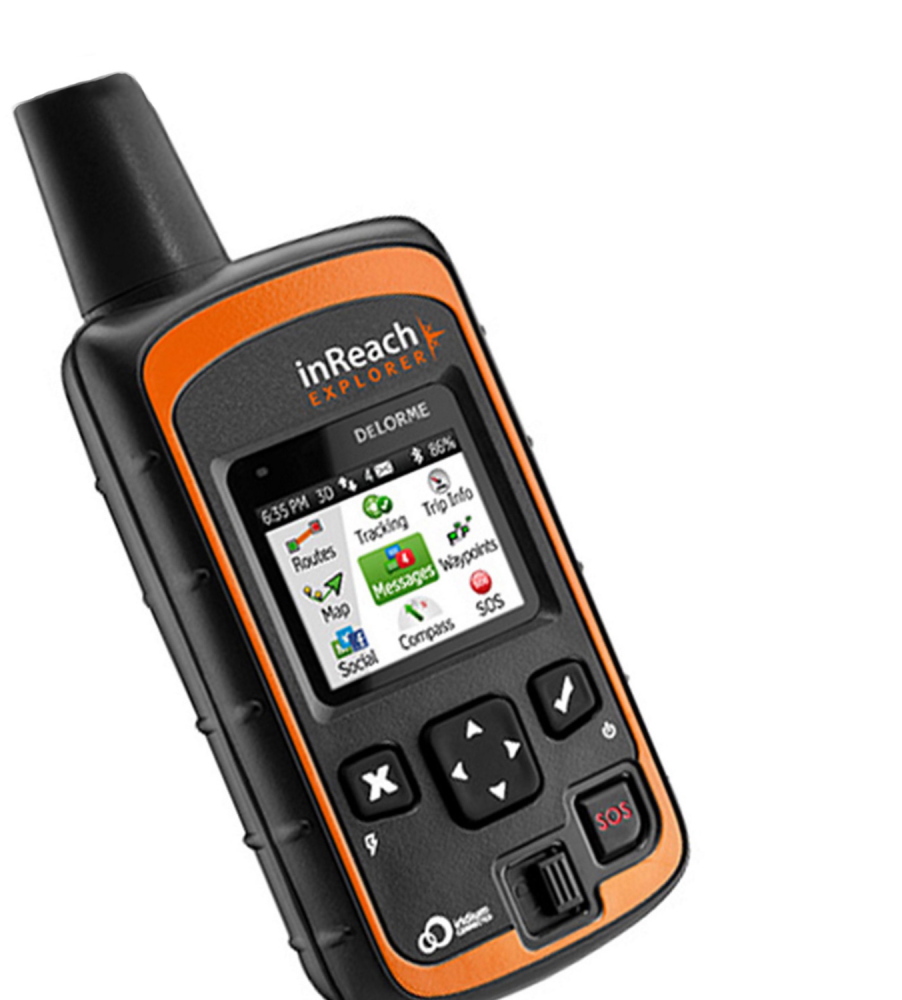The CEO of DeLorme Publishing – the company famous for maps such as the Maine Atlas and Gazetteer and the gigantic revolving Earth in the window of its Yarmouth headquarters – has vowed to fight a $6.2 million fine levied against it last week in an ongoing patent battle over its line of hand-held satellite communication devices.
“We’re going to protect our reputation and prove we’ve done nothing wrong,” CEO Michael Heffron said in a recent interview, noting that the device is responsible for half of the company’s roughly $20 million in annual revenue.
He said the company would appeal the federal government’s penalty to the U.S. Court of Appeals for the Federal Circuit, which handles appeals in patent cases.
“We are committed to continuing the process in federal court to have this patent looked at and to help other people understand that DeLorme followed the rules,” Heffron said.
The International Trade Commission on June 10 imposed a $6.2 million civil penalty on DeLorme for violating a consent order signed in April 2013 related to a patent infringement case brought against DeLorme by a company in Virginia. The commission on Tuesday released only a notice of the penalty. A more detailed decision, including the commission’s reasoning behind the penalty, won’t be available for at least another week.
DeLorme’s future is at stake in the patent battle. The company has spent several years transforming itself from a provider of primarily paper and digital maps. Its line of two-way emergency satellite communication devices, which it introduced nearly three years ago, now accounts for half of its revenue, Heffron said.
The dispute pits DeLorme, which employs 75 people in Yarmouth, against Virginia-based BriarTek, which has a patent for an emergency, two-way, text-based communication system that uses a satellite infrastructure. BriarTek claims DeLorme is infringing on its patent by manufacturing and selling a line of two-way, satellite communication devices, which DeLorme markets under the inReach brand. DeLorme and its attorneys believe BriarTek’s patent is invalid because it does not contain a novel idea as required by U.S. patent law.
Who’s right will be decided in two ongoing court battles: DeLorme’s pending appeal of the trade commission’s finding and penalty, and another separate ongoing case in which DeLorme has asked a federal judge in Virginia to invalidate BriarTek’s patent.
In the meantime, DeLorme plans to continue selling its InReach SE and 1.5 devices, Heffron said, despite the fact it could expose the company to further penalties.
TWO-YEAR BATTLE, AND COUNTING
Heffron at DeLorme said he was “baffled” by the trade commission’s recent decision to levy such a large fine.
“I think we’re certainly disappointed that the ITC decided to intervene in a case that basically pits two U.S. companies against each other, which is not the charter under which they were created,” he said. “I’m also disappointed that they didn’t take into account that we actually build the units and employ the people who build the units in Maine. We don’t import anything other than minor components that anybody who builds any type of electronic equipment will have to import.”
Peter Brann, DeLorme’s attorney, said he was confident that an appeal would be successful given that “the size of that penalty is completely out of proportion to what’s going on here.”
The $6.2 million penalty, which is based on the number of days the trade commission said the company has been in violation of the consent order, is the latest development in a case that began in August 2012 when BriarTek filed its complaint with the International Trade Commission. It chose that venue because at the time DeLorme was manufacturing its inReach products overseas and importing them to the United States. BriarTek accused DeLorme of infringing on a U.S. patent it received in 2011 for its emergency communication system capable of two-way text messaging using a satellite network.
The trade commission agreed to investigate, but dropped the investigation in April 2013 after DeLorme began manufacturing its inReach products in Yarmouth and signed the consent agreement, promising not to import any two-way global satellite communication devices, system or components that infringe on BriarTek’s patent. The consent agreement was not an admission of guilt, Brann said.
However, within days, BriarTek filed another complaint alleging that the third-party resale of DeLorme’s inReach products at outdoor retailer REI, and the importation of foreign-made components from Iridium Satellite Inc., violated the consent agreement.
An administrative law judge at the International Trade Commission found in March of this year that DeLorme had not directly infringed on BriarTek’s patent, but did violate the consent agreement by inducing others to infringe. Brann called the finding “absurd on its face.”
The judge “agreed with us on most everything except on this one issue, and on this one issue we think she got it completely wrong,” Brann said at the time. “Having induced infringement without direct infringement is like staging ‘Hamlet’ without the prince.”
A month later, on April 23, the commission reversed part of its own judge’s decision and broadened DeLorme’s exposure to daily penalties for being found in violation of the consent agreement. It also said DeLorme had acted in “bad faith” in its violation of the consent order.
Heffron said DeLorme lost millions of dollars when it signed the consent agreement and stopped manufacturing inReach devices for four months as it transitioned its offshore manufacturing to Maine.
“I don’t know how we acted in bad faith when we stopped the business for almost four months, lost north of $2.5 million, hired a new work force, and then nine or 10 months later someone wakes up in the government and says, ‘We don’t like what you did. I think you should have done this,’ ” Heffron said.
The commission’s issuance of the $6.2 million penalty is a result of that April decision. The penalty is owed to the U.S. government, not BriarTek.
John Fuisz, BriarTek’s attorney, said his client would be happy if the penalty forces DeLorme to comply with the consent agreement.
“BriarTek is merely seeking a fair playing field in which to develop the technology,” Fuisz wrote in an email. “It is DeLorme’s decision to violate the consent order and fight the U.S. government.”
If Fuisz hopes DeLorme will stop manufacturing and selling its inReach devices – which cost roughly $250, about half the price of BriarTek’s emergency communication device, Cerberus, which is intended for a government and military market – he will be disappointed, according to Heffron. DeLorme will continue to sell its inReach devices despite its mounting exposure.
The current penalty is assessed through April 2014, according to Fuisz.
“If there have been additional sales of InReach SE or 1.5 devices there will be additional fines. The appeal does not stop the application of the consent order,” Fuisz said.
He said he feels “very good” about the U.S. government’s chances of beating DeLorme’s appeal.
BIG NAME IN DELORME’S CORNER
DeLorme has a powerful ally in this case, though one that has chosen not to throw its weight around. Iridium Communications, the Virginia-based satellite phone company that posted $382.6 million in revenue last year, owns the private satellite network that DeLorme and BriarTek both use for their emergency communication devices.
Iridium’s attorneys submitted a response to BriarTek’s initial complaint before the trade commission that said it would be against the public interest to force DeLorme to stop selling inReach devices because of the public safety implications. That, so far, is the extent of Iridium’s involvement in the case.
Iridium has for several years been encouraging manufacturers like DeLorme and BriarTek to develop satellite communication devices, said Doug Ritter, director of the Arizona-based Equipped to Survive Foundation, which provides reviews and news in the survival gear industry. As the owner of a satellite system and the manufacturer of specialized components in DeLorme’s inReach devices, Iridium gains from more companies selling more products to more consumers, Ritter said.
“So, clearly they have an incentive to develop more devices that will get into more hands,” Ritter said. “The potential upside for them and manufacturers like DeLorme and others is that there’s a huge potential market.”
DeLorme has not been in direct communication with Iridium concerning the case, said Kim Stiver, a DeLorme spokeswoman.
Diane Hockenberry, an Iridium spokeswoman, said the company is not willing to comment on the case.
Send questions/comments to the editors.




Success. Please wait for the page to reload. If the page does not reload within 5 seconds, please refresh the page.
Enter your email and password to access comments.
Hi, to comment on stories you must . This profile is in addition to your subscription and website login.
Already have a commenting profile? .
Invalid username/password.
Please check your email to confirm and complete your registration.
Only subscribers are eligible to post comments. Please subscribe or login first for digital access. Here’s why.
Use the form below to reset your password. When you've submitted your account email, we will send an email with a reset code.